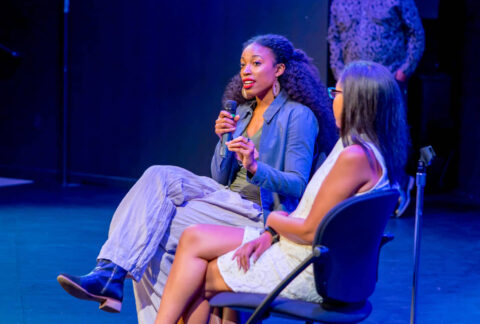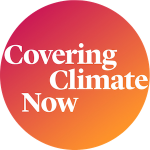News
Grasslands and Wetlands Are Being Gobbled Up By Agriculture, Mostly Livestock
Research•4 min read
Perspective
Jasmine Leyva, director of The Invisible Vegan, unpacks the complicated relationship between people of color and the climate movement.


Words by Jasmine C. Perry
 This story is a part of Covering Climate Now’s week of coverage focused on Climate Solutions, to mark the 50th anniversary of Earth Day. Covering Climate Now is a global journalism collaboration committed to strengthening coverage of the climate story.
This story is a part of Covering Climate Now’s week of coverage focused on Climate Solutions, to mark the 50th anniversary of Earth Day. Covering Climate Now is a global journalism collaboration committed to strengthening coverage of the climate story.Math is one of the only subjects I trust because, as much as I hate it, math is without bias. Learning the Pythagorean theorem and quadratic equations never challenged my identity as a black American woman like English classes, where I was forced to abandon the colloquialisms my community added to the language to write in proper white English. In history class, I was taught to revere slave owners as national heroes and founding fathers, while textbooks limited the description of my “founding fathers” to stories of chains and oppression. In health class, they weighed me, showed me an obesity chart, and judged me based on how well my body fit into a Eurocentric ideal. Then, there was science.
Science was fun. We went on museum trips, studied the clouds, and learned about animals, the food system, and the power of amino acids. But as an adult, I began to understand the role this seemingly innocent institution played in upholding racial oppression. Throughout history, social sciences were consistently manipulated so people of color were construed as inferior. The same “science” used to justify racial enslavement and extermination was not merely speculation among bigots, but a popular theory validated by prodigious scholars all over the world. Polygenism, eugenics, survival of the fittest: all of these theories succeeded in keeping scientists from recognizing their own ignorance. As a result, popular discourses on race slip through the cracks. But they don’t get past me.
Today, climate change threatens to disrupt the balance between nature and man with food-system-destroying heat waves, soil erosion, deadly hurricanes, floods, deforestation, and other natural disasters that will disproportionately impact people of color in terms of home displacement, lack of access to clean water, death, and hunger. Considering the severity of this looming event, it is imperative that, as a woman of color, I look beyond transgenerational traumas, work to build awareness in my community about the storm ahead, and try to build a relationship of trust with the institutions and groups of people that have let me down.
We don’t talk about the importance of trust in relation to issues like climate change, but trust is the foundation of most healthy relationships. One critical question we should start asking when we notice racial groups steering away from certain topics is, “What happened that may have created distrust in this relationship?” If I had to answer this question about people of color and climate change, I would argue that the lack of diverse voices in the climate change movement, or any global movement, creates distrust among members of the community who are not represented.
In September 2019, I came across an article on Time’s website entitled, “Meet 15 Women Leading the Fight Against Climate Change,” but the “Top 10, 50, 100” articles from mainstream outlets always give me pause because I don’t trust their ability to be inclusive. Before reading these articles and looking at the images associated with them, I tend to ask myself, am I in the mood to see brilliant people of color tokenized? Am I in the mood to see white women get all the glory for leading the fight against climate change while the contributions of every other culture are variously overlooked, underappreciated, or wholly dismissed?
Hoping for the best, I clicked the title anyway. There it was—fifteen women of different nationalities, races, and creeds being honored for their unique contributions.
I remember seeing the image of Rhiana Gunn-Wright with her beautiful locks, her hoops, her full lips, and brown skin, followed by Hindou Oumarou Ibrahim with her headwrap. I remember yelling, “Yass queens, ya betta represent,” with so much love and excitement in my heart. No white woman would jump up and down after seeing a white woman mentioned in this article. But unlike my white sisters, I don’t get to see this every day.
Women of color in science and politics don’t get fair visibility. So seeing this black, Yale-educated, Rhodes scholar who didn’t conform to white-centered visual politics leading a fight against climate change gave me pride for who I am and made me feel like I was welcome in the climate space. I am no longer invisible. I can take down my guard.
But just like an untrustworthy boyfriend who overcompensates to win back my affection, the minute I started to mend my relationship to the climate movement–another gut punch. In January, climate change activists Vanessa Nakate, Greta Thunberg, Luisa Neubauer, Loukina Tille, and Isabelle Axelsson spoke at a news conference in Davos. After the talk, the women took a group photo together. But when the Associated Press (AP) published the photo, they cropped out Ugandan activist Vanessa Nakate, leaving only her white counterparts in the frame.
Nakate responded to the faux pas on NBS, an African news network, by saying, “What I feared to find is what I found. And to add on that, I had not been introduced as one of the activists, who were at the press conference, and there’s nothing written about what I [sic] said at the press conference.” Later in the same interview, she explains where that fear of being silenced and erased stemmed from. “People from Africa are suffering as a result of the climate crisis and we have not heard African voices fully represented on the world stage. So, it was really hard to see I had been cropped out because it was a form of silencing me.”
AP replied to the situation by saying there was “no ill intent,” which as a woman of color, terrifies me. Major media organizations don’t see the ill intent in habitually stripping credit from a young woman and race of people that deserve to be there. A moment that should have been about Mother Earth and about bringing climate stories to the forefront of social and political discussions around the world got eclipsed by a photo that reinforced what we saw during the Paris agreement and throughout the climate movement, in general. Climate leaders are invested in saving the world, just not our world. So many people of color have internalized that attitude and, as a result, they don’t care about climate change either.
My mother went to a segregated school. Not my grandmother. Not my great grandmother. My mother. We are not far enough removed from legalized racism for me to wholeheartedly trust any predominantly white institution, even one that is trying to save the world. This is where a line needs to be drawn. I cannot allow my pain to blind me from seeing the good people involved in the climate movement or stop me from being a part of the much-needed change. My desire to trust and heal is there, but the climate community has to be conscious of how ignorance and tokenism can reopen old wounds.
When we discuss societal problems, we tend to dissect the problem itself without examining the health of the emotional relationships people have with these issues. Sometimes, the more trust we establish in a relationship, the more people are willing to participate and cooperate. The most important message in the world would fall on deaf ears if delivered by an untrustworthy source. A person that earns my trust, earns my attention, my dollar, and my commitment.
Climate change is no different.